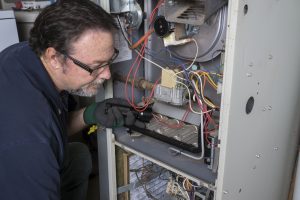Air conditioning, heating, and refrigeration are services that you probably don’t think much about unless your units are faulty. And when these components malfunction, you cannot wait for the HVAC technician to fix them. HVAC technicians spend their days installing, repairing, and maintaining indoor climate control systems — ones that would be dangerous and impossible to DIY.
HVAC technicians work in a variety of settings, including schools, hospitals, and even factories. But what is the average HVAC technician salary? Is the HVAC career rewarding? If you want to become an HVAC technician, one of the things you are likely curious about is the average HVAC technician salary.
Before we dive into the HVAC salary outlook, let’s look at the HVAC technician job specifications and the required skills that one would need to become an HVAC technician.
What Do HVAC Technicians Do On a Day-to-day Basis?
While HVAC companies have varying job descriptions for HVAC technicians, here are some of the tasks that technicians carry out.
- Installation, maintenance, and repair of HVAC systems
- Performing preventive maintenance on already installed systems to increase the longevity and functionality of HVAC systems
- Discuss HVAC options with clients and help them decide the best options based on their needs
- Troubleshoot mechanical and electrical faults on HVAC systems
- Help customers adjust to the ideal temperatures to keep their spaces comfortable
What Qualifications Do You Need To Become an HVAC Technician?
Job qualifications differ with HVAC providers. However, for a person to become an HVAC technician, they need to have completed an HVAC training program. As such, a state HVAC technician license will be required. Employers may also require a valid driver’s license and proficiency with power and manual tools.
HVAC Salary Outlook
According to the U.S Bureau of Labor Statistics, the average HVAC technician salary is $50,590, with the lowest earners making less than $31,910 and the highest earners making more than $80,820. This range also applies to an HVAC installer salary.
When it comes to the HVAC salary outlook based on the top industries in which they worked, HVAC technicians who worked in educational services were the top earners, with an annual average of $54,260. This was closely followed by the wholesale trade and retail trade, which displayed average earnings of $53,310 and $50,520 respectively. The heating, air conditioning, and plumbing contractors earned an average of $49,240.
The average commercial HVAC salary is $61,425 annually. The HVAC apprentice salary is half the wage earned by experienced workers. However, this increases as the apprentices learn more in their respective fields.
Why Should You Start an HVAC Career?
The HVAC sector is growing at a high rate. Here are some of the factors that are contributing to high HVAC job growth.
- The Emergence of New Technology
Scientific breakthroughs are evident in the HVAC industry. Take, for instance, equipment used in central air systems and refrigeration. Due to these discoveries, HVAC systems are becoming more advanced and more complex. And as a result, the demand for HVAC specialists continues to grow, as people require trained professionals to undertake installations, repairs, troubleshooting, and maintenance in their homes and businesses.
- Extra Opportunities for Skills Advancements
Most people start their HVAC careers as apprentices. While the salary range is not as attractive compared to that of trained HVAC specialists, this increases as a person becomes better at the craft. And with the many opportunities for skills advancement, technicians can improve their skill set, which may, in turn, improve their salary.
- Availability of HVAC Job Varieties
When people hear the term HVAC technician, what generally comes to mind is a person who conducts basic installation, repair, and maintenance of HVAC systems. However, HVAC technicians have different job classes that they can choose, depending on their education level, expertise, and even preference. For instance, most experienced HVAC technicians end up becoming HVAC engineers or even HVAC managers.
What Factors Determine the Salary of an HVAC Technician?
- The Location
Geographic locations play a huge role in HVAC salaries. This is because different companies have varying payment standards that may also be regulated by state laws.
- The Employer
While employers may comply with the state minimum wage, you will find variances in what each employer pays, as well as differences in additional benefits.
- Your Experience
The higher the experience, the higher the pay. This is why HVAC specialists are encouraged to advance their education. For instance, an HVAC specialist who is proficient at HVAC tasks and has a proven sales record may earn better than those who only have one prominent skill.
- The Sector
Sectors play a huge role when it comes to HVAC salaries. For instance, commercial HVAC salaries tend to be higher than domestic HVAC salaries.
- Your Education Level
Education levels play a significant role in the HVAC salary outlook. For instance, persons who hold HVAC-R Associate Degrees earn better than those who hold HVAC Bachelor’s Degrees.
Extra certifications also add to the salary advantage. HVAC technicians should be on the lookout for relevant certifications such as commercial AC certifications, heat pump certifications, commercial air conditioner certifications, and even commercial refrigeration certifications.
What Skills Are Essential for an HVAC Specialist?
The more experience a technician has, the better the pay. To stay in demand, HVAC technicians need to have the following:
- Soft Skills
Soft skills, also known as “people skills,” can be pivotal in helping technicians excel in their HVAC careers. For instance, it is important for technicians to be dependable and have good communication skills.
Due to the nature of the industry, HVAC technicians should be prepared to receive emergency calls from worried customers. They should also know how to assure customers that their issues will be sorted in a timely and professional manner.
- Hard Skills
These are skills that ensure that the technician is competent at their job. For instance, technicians should perform load calculations for heating and cooling systems, understand the functions of refrigeration systems, and know how to build and maintain interior environmental control systems.
Bottomline
An HVAC career is an exciting venture with decent pay and opportunities for advancement as technicians gain experience. As well, the field is only expected to grow as more commercial structures and homes are built.








